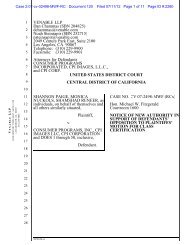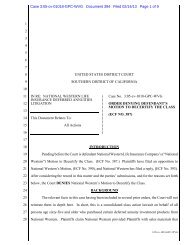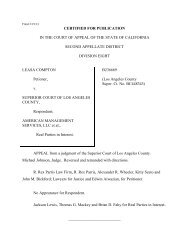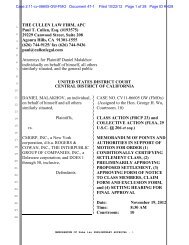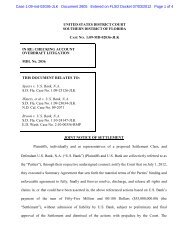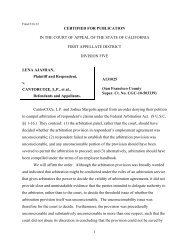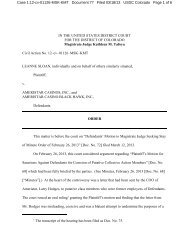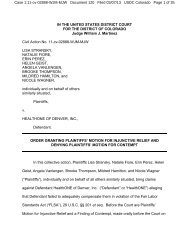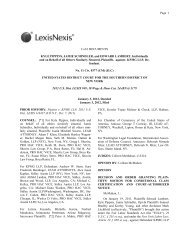here - FindLaw
here - FindLaw
here - FindLaw
You also want an ePaper? Increase the reach of your titles
YUMPU automatically turns print PDFs into web optimized ePapers that Google loves.
Neither 24 Hour Fitness nor any other California decision has precisely defined<br />
the limitations that the covenant places on an employer‘s unilateral right to modify an<br />
arbitration agreement. In general, while the covenant may imply limitations making the<br />
use of that right fair and in good faith, it may not give rise to duties or obligations that<br />
conflict with the agreement‘s express terms. (See Carma Developers (Cal.), Inc. v.<br />
Marathon Development California, Inc. (1992) 2 Cal.4th 342, 374; Camp v. Jeffer,<br />
Mangels, Butler & Marmaro (1995) 35 Cal.App.4th 620, 630.)<br />
We find guidance in Russ Berrie and Co., Inc. v. Gantt (Tex.Ct.App. 1999)<br />
998 S.W.2d 713. T<strong>here</strong>, a Texas resident sought to litigate his employment claims in<br />
Texas state court against a New Jersey-based employer. The employee‘s contract<br />
provided that it was to be interpreted under the laws of the State of New Jersey. (Id. at<br />
pp. 716–717.) The contract also reserved to the employer ―‗the right at any time to<br />
change, interpret, discontinue or modify this Agreement.‘‖ (Id. at p. 716.)<br />
The Texas Court of Appeals first examined and upheld the validity of the choiceof-law<br />
provision, adopting New Jersey law. It then determined that the modification<br />
provision did not render the arbitration agreement illusory, saying: ―The contract<br />
provision which allows [the employer] to unilaterally modify any of the contract terms is<br />
. . . problematic. Were we to interpret this contract under Texas law, we might well find<br />
that this clause renders the agreement illusory, as nothing would bind the employer to any<br />
of its terms. Under the bare modification language, we see nothing which would prevent<br />
[the employer] from disavowing any part of the agreement at its sole option. T<strong>here</strong> is<br />
nothing in the contract language, then, which would bind [the employer] to arbitrate a<br />
dispute, or accept an arbitrator‘s adverse decision.<br />
―New Jersey law, however, implies a duty of good faith and fair dealing in all<br />
contracts, including employment contracts, regardless of whether the relationship is<br />
characterized generally as at will. W<strong>here</strong> a modification, interpretation, or<br />
discontinuation of the contract must comply with the duty of good faith, we conclude that<br />
the company could not refuse to comply with the arbitration clause once a dispute arising<br />
42



